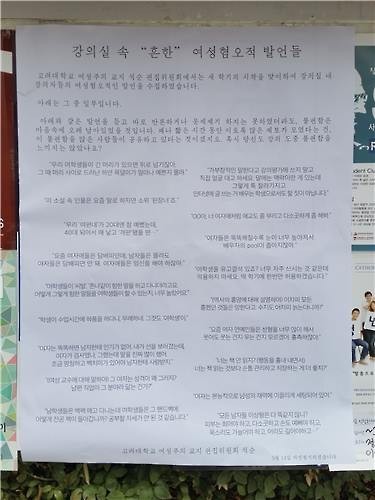A few days ago, a poster was pinned up on a bulletin board at Korea University in Seoul, in which a group of female students lambasted their lecturers for discriminatory remarks against women.
The poster put up across the campus included testimonies from about 40 female students who had experienced sexist remarks based on their gender.
The comments that had allegedly been made by professors described women in general as only looking after their appearance and relying too much on men. Some of the lecturers allegedly advised female students to “behave” themselves and not to smoke or swear.
The poster put up across the campus included testimonies from about 40 female students who had experienced sexist remarks based on their gender.
The comments that had allegedly been made by professors described women in general as only looking after their appearance and relying too much on men. Some of the lecturers allegedly advised female students to “behave” themselves and not to smoke or swear.

One of the comments on the poster read: “Women are not popular when they are clever. I was once set up with a female prosecutor, but she talked too much. Women can be loved when they are slightly stupid.”
The poster was put up by members of Korea University’s feminist magazine Seoksoon.
“Comments that disparage women can be commonly heard in university lecture rooms. People probably could not raise the issue or talk right back at such comments, but discomfort has been shared by many,” said Lee So-min, a member of Seoksoon. “We decided to put up the poster to raise awareness about gender discrimination faced by female students.”
South Korea is known to have a wide gender gap, with the World Economic Forum’s Global Gender Report in 2015 placing Korea at 115 out of 136 nations in terms of gender equality.
According to the group, one of the professors at the university took issue with a menstruation leave system granted for women on their period. He allegedly said that he would only allow students to take the leave once a semester, accusing them of abusing the system.
The group did not identify the professors quoted in the poster.
Gender discrimination has been seen as prevalent on campuses, as shown by a 2010 survey.
According to the survey on 530 male and female students by job search engine Albamon, 52.8 percent of men and 56.3 percent of women said that they had experienced discrimination at schools.
Of them, 57.6 percent said that the offenders were professors, followed by senior students at 23 percent, fellow students of opposite sex at 14.2 percent and school council members at 12.8 percent.
The survey also suggested that 27.4 percent of the sexual discrimination took place at alcohol-fueled gatherings, followed by lecture halls at 25.7 percent and college events at 20.8 percent.
No Jeong-min, a counsellor at the university’s gender equality center, pointed to a generational gap as one of the reasons behind such gender discrimination on campus.
“Gender discrimination has existed for decades on campuses in Korea, not only at Korea University,” No told The Korea Herald.
“Sexual stereotypes have long existed in Korea’s patriarchal society and the older generation might still be gripped by such perceptions,” No said.
“But as society changes students are more sensitive about gender issues nowadays ... Especially at educational institutes, lecturers should make more efforts to understand what constitutes gender discrimination and why such discriminatory remarks are problematic.”
The discrimination is equally felt among male students on campus, said a 28-year-old university student, who wished to remain anonymous.
“I was devastated when I felt that school assignments were evaluated not by fair yardsticks but by gender,” he said of his experience in engineering classes with a few female students. “Some professors are notorious among male students for giving advantages in school tests to female students.”
The Albamon survey also showed that 23.8 percent of the respondents considered giving generous scores to a student of a certain gender as sexually discriminative.
“Gender is not given, but it is shaped by social perceptions. Women and men alike can be discriminated against on campus,” said Lee Na-young, sociology professor at Chungang University. “Gender equality pursues that personal differences such as sexual preferences and gender should not lead to discrimination.”
“Such a movement (like putting up a poster on the wall) is a good sign that students are aware of sexual discrimination and are taking action to tackle the problem,” she said. “This is the beginning.”
By Ock Hyun-ju (laeticia.ock@heraldcorp.com)
-
Articles by Ock Hyun-ju


![[Exclusive] Korean military set to ban iPhones over 'security' concerns](http://res.heraldm.com/phpwas/restmb_idxmake.php?idx=644&simg=/content/image/2024/04/23/20240423050599_0.jpg&u=20240423183955)

![[Graphic News] 77% of young Koreans still financially dependent](http://res.heraldm.com/phpwas/restmb_idxmake.php?idx=644&simg=/content/image/2024/04/22/20240422050762_0.gif&u=)



![[Pressure points] Leggings in public: Fashion statement or social faux pas?](http://res.heraldm.com/phpwas/restmb_idxmake.php?idx=644&simg=/content/image/2024/04/23/20240423050669_0.jpg&u=)










